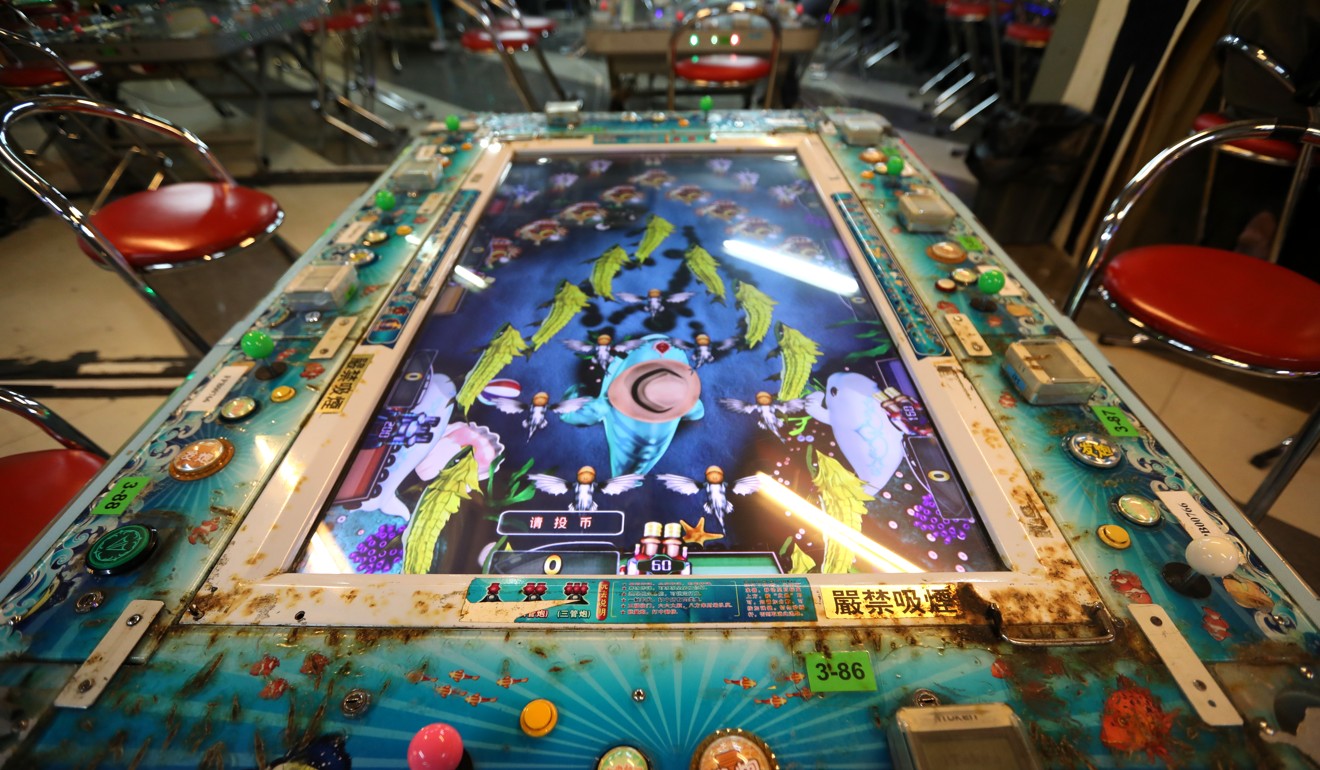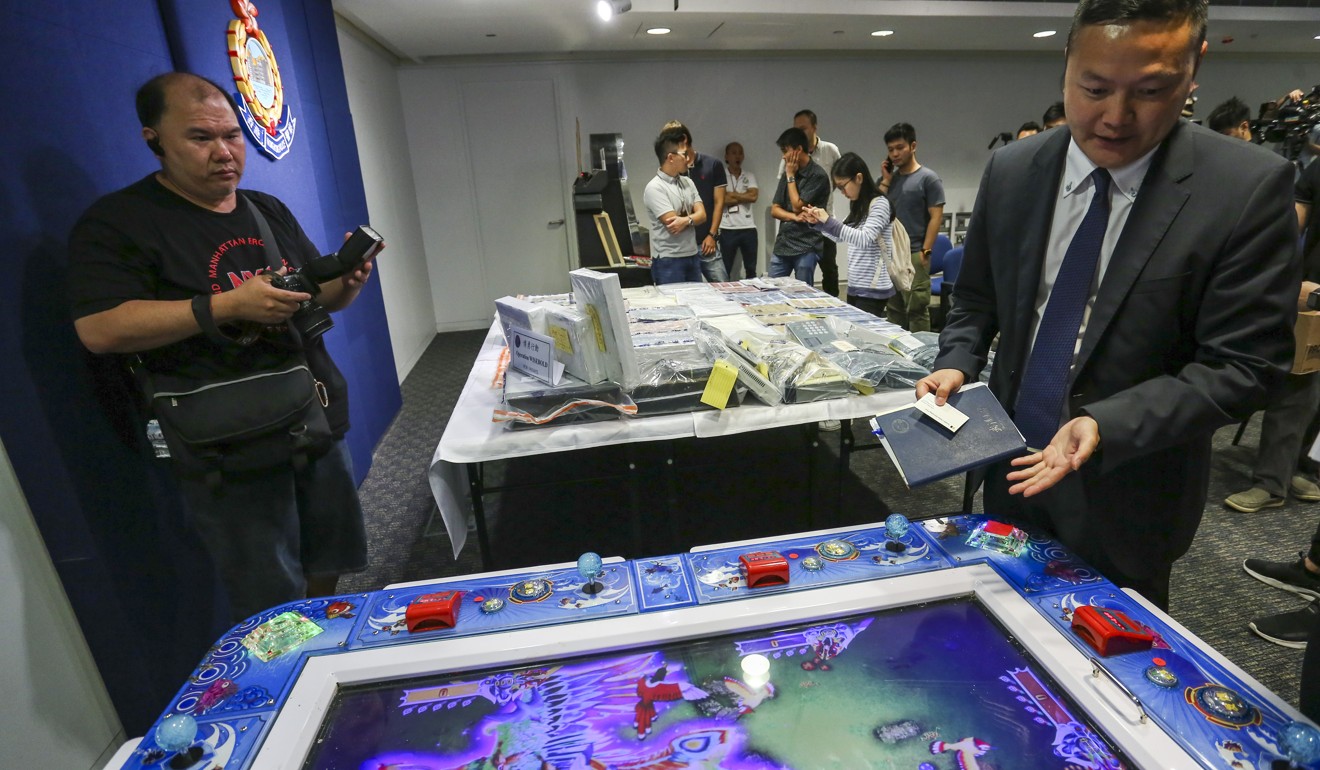
The lure of easy money: arcade thrills lead Hong Kong’s young gamers to gambling, massive debts
- Arcade operators get gamers hooked on ‘fishing game’ by exchanging points for cash
- Caritas centre helps gamblers kick the habit, deal with debts of HK$100,000 or more
Salesman Adrian pops into an arcade in Mong Kok while waiting to meet his friends on his day off.
Soon he is seated transfixed, playing a video game that involves shooting at sea creatures appearing on screen, and earning points for every success.
Racking up a score of around 200,000 in the “fishing game”, he says: “If I get 300,000 points, I can exchange them for a few hundred dollars.”

Adrian, not his real name, declines to reveal how he makes money. The 28-year-old admits he often spends more than he earns, but still plays twice a week, forking out more than HK$100 (US$13) each time.
Before they start, players must buy a card from the arcade for HK$20 and pay more for games tokens.
Adrian says the fishing game is more thrilling than other video games and helps him kill time.
“I started playing a few months ago,” he says. “It is like the slot machine but more exciting.”
While playing these games is not unlawful, exchanging points for cash is, and this happens at some arcades or illegal gambling dens. Operating games establishments for the purpose of gambling is also against the law.
Police have cracked down on such crimes in recent years, and warned that first-time customers might find it easy initially to win at fishing and get hooked when they convert their points for cash. But culprits then alter the games machines to make winning more difficult.
Many of the establishments are controlled by triads, police said, raking in tens of thousands of dollars each day.
Triad-linked gambling dens smashed in citywide police swoop
Besides the risk of breaking the law, social workers and experts warn that those engaged in such gambling activities also risk addiction, incurring debts and getting hooked on other forms of gambling, such as betting on football and horse races.
Alfred Chan Chi-wah, senior social work supervisor at Caritas Hong Kong, the NGO which runs programmes to meet various community needs, says: “Some young gamblers can have debts of up to HK$100,000 as they become addicted to winning back what they have lost.”
Last May, police arrested 135 people, including two 15-year-olds, during citywide raids on a dozen games centres and 51 illegal gambling dens. Those arrested included customers as well as den operators.
Officers seized 153 games machines, including fishing games and slot machines. The arcades and dens were mostly around Mong Kok and Sham Shui Po, and some were said to have been peddling drugs and offering high-interest loans.

In March last year, similar raids resulted in 267 arrests at 12 licensed arcades and 26 illegal dens, with 440 games machines seized.
On January 7 and 8 this year, police arrested seven men and two women, and seized eight games machines, when they raided two illegal gambling dens in Sham Shui Po and To Kwa Wan.
The seized machines were for playing the fishing game. Police said at both places, gamblers recorded their scores to exchange for cash.
According to police, 5,048 people were arrested for involvement in illegal gambling in 2018, up 33 per cent from 3,790 in 2009. More than 3,200 were arrested from January to November last year.
Fishing for quick cash, sinking in debt
Ah Ming was 18 when he started going to arcades with friends to play the fishing game about four years ago. He had dropped out of school after Form Five and heard he could earn easy money.
“At first, I just wanted to have more money to go out with my friends and it was attractive as I could earn so much without having to work hard,” he says. “You get points for ‘killing’ some creatures. There isn’t much technique to it.”
The first time he played, he paid less than HK$100 and won a few hundred dollars. It was the start of more frequent visits.
Within months, however, his luck seemed to run out and it was not so easy to make money.
Hong Kong gambling addicts and victims talk about excess betting
Ming switched to football betting. “I did make some money, but because I did not stop, I lost it all,” he recalls.
He was working part-time in the food and beverage industry, earning HK$7,000 to HK$8,000 a month, but could lose it all in just a day or two of football gambling.
Instead of quitting, he gambled more aggressively, borrowing money from lending companies that charge high interest rates.
“I gambled away all the money I had,” Ming recalls.
He racked up debts of HK$100,000 which his middle-class family helped to repay.
A year ago he started a job in construction, earning around HK$26,000 a month, and soon most of his debts were cleared.
UK gambling trap warning for Chinese students far from home
It seemed like an opportunity to turn over a new leaf, but when he began receiving phone calls from lending companies offering loans, the temptation was too great.
He borrowed, resumed gambling, and this time accumulated HK$300,000 of debts.
Desperate, he knew he needed help.
‘Teach risks of gambling to the young’
The most recent large-scale study on gambling was done in 2016 by researchers from Hong Kong Polytechnic University, who found that betting figures had gone down in the preceding years.
In a random poll of 2,045 members of the public, they found 61.5 per cent had gambled in the past year, down from 62.3 per cent in 2012 and 80.4 per cent in 2005.
The study also found that 1.4 per cent of respondents had been diagnosed with a gambling disorder, down from 2 per cent in 2012.

Chan, who works at the Caritas Addicted Gamblers Counselling Centre, says the impact remains large.
“With a population of 7.5 million now, 1.4 per cent means 105,000 cases,” he points out. “Moreover, past experience tells us that one gambler’s problems can affect 12 to 15 other people, such as his family members.”
He is concerned that gambling has become more diverse in Hong Kong with the arrival of activities such as the fishing game.
This type of gambling was not tracked specifically in the PolyU study, which focused on more traditional forms of gambling including the Mark Six lottery, betting on horse racing and football, and gambling in Macau’s casinos.
Hong Kong can hold its own against new exchange on Macau’s block
Chan notes that annual data collected by Caritas continue to be of concern. The number of problem gambler cases rose from 283 in 2017 to 353 in 2018 and 420 last year.
Chan points out that his centre saw a spike in clients over the three months following the World Cup football tournament in 2018, 2014 and 2010.
With the European Football Championship coming up this year, he fears the number of gamblers in trouble will rise again.
Ivan Chan King-lok, a counsellor at Caritas Hong Kong, notes a trend of people gambling at a younger age and has been helping more individuals aged 25 or younger.
“You can bet online now with apps of the fishing game and also on QQ and WeChat,” he says, referring to the Chinese messaging programmes.

The legal gambling age in Hong Kong is 18, but the PolyU study found that 43.6 per cent of those who recalled the first time they gambled said they did so before turning 18. That figure was 39.6 per cent in 2011 and 34.2 per cent in 2008.
Alfred Chan recalls a school that approached the centre for help after a student used the credit card of a schoolmate’s parent to gamble.
There have been child gamblers as young as 10, which shows that more prevention efforts are needed, he says.
While the government has done much to tackle problem gambling, Alfred Chan and others believe support can be more targeted.
He hopes society as a whole can do more to teach young people financial management, so that gamblers will not fall so easily into the trap of betting as a way to make quick money.
Chan believes there is a need for a wider study on football betting, which was legalised in Hong Kong in 2003.
Macau casino revenues slip 8.5 per cent in November
Dr Chung Kim-wah, a social policy scholar, says given the plethora of gambling options available now, there is a need to strengthen education in secondary schools.
There are four centres tackling problem gambling that are funded by the government, including the Caritas centre.
Chan hopes the current four-year contracts for funding can be made more long-term, to bring about greater stability and enable the centres to retain staff and establish a relationship with their clients.
For those who are deep in debt, the centre offers financial counselling, which begins with understanding clients’ income, expenses, and ability to repay.
“The next step is to talk to banks and lending companies on how to extend the repayment period, in order to reduce the financial pressure on the clients and, in turn, the urge to gamble,” he says.
Easy loans are fuelling gambling debts, addiction charity Caritas warns
For clients who are unable to repay their debts, the centre helps them obtain pro bono legal assistance to make the most suitable decision. Some opt to declare bankruptcy, Chan says.
Ah Ming, now 22, has been visiting the Caritas Addicted Gamblers Counselling Centre on and off for a year and says he is more determined to quit gambling this time.
He is more settled in his current job and has kept on the straight and narrow for more than three months.
It helps that his parents now keep his ATM card and control his daily expenses. Every month, 70 per cent of his salary goes towards repaying his debt, with about a quarter cleared now.
“Now that I am working, I have started to understand the importance of money,” he says. “Betting can be very serious and cause you not to think properly.”
Additional reporting by Fiona Sun and Clifford Lo

